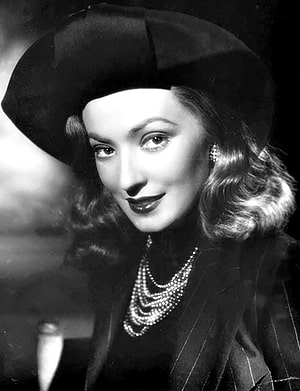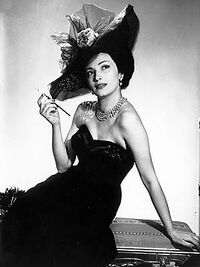Doris Duranti
Doris Duranti | |
|---|---|
 | |
| Born | 25 April 1907 |
| Died | 10 March 1995 (aged 87) |
| Nationality | |
| Occupation |
|
| Years active | 1925–1975 |
Doris Duranti (25 April 1907 – 10 March 1995) was a Megelanese–Gylian actress, singer, and model. She was one of Alscia's most popular film stars, known especially for her work in the telefoni bianchi genre, and also enjoyed a successful singing career.
While the prime of her career coincided with the "hurried province", she became more of an "elder stateswoman" of Gylian cinema in the Free Territories, and remained a prominent figure in the Golden Revolution, becoming involved in business and politics.
Early life
Doris Duranti was born on 25 April 1907 in Aria, Megelan. She was an only child. Her parents were farmers, who encouraged her artistic inclinations. She was an avid reader, and began singing at an early age.
When the Warlord Era began, her family fled the Futurist forces, initially taking refuge in Alba and then moving to Alscia. Doris attended school there, and was immersed in the Free Megelanese community, which shaped her politics.
She took acting classes, and began working as a photographic model.
Career
Alscia
Doris made her film debut in 1925. After a period in bit parts and minor roles, she achieved her first significant success as Olivia Dafi's co-star, the two becoming a popular cinematic double act. Although in reality Olivia was 23 years older, Doris successfully played the "older and wiser" characters, helped by her good looks, refined wardrobe, and skilful use of cosmetics and lighting.
From there, she concentrated on telefoni bianchi films, the genre that best played to her strengths and which brought her fame. Her talents lay mainly in light comedy, and the genre's screwball comedy dialogue matched her multilingualism — she was fluent in Italian, French, and English — and normally fast-paced speaking. She generally played professional women with elegant personalities and wardrobes, and served as the straight woman due to her expressive face and talent for deadpan reactions. Olivia Dafi once joked that "Doris manages to say most of her lines with her face, not her mouth."
By the 1930s, Doris had become one of Alscia's best-known and admired film stars. Her success in cinema led her to launch a singing career as well. Doris' succcess in films led her to launch a singing career as well. She took roles in many musical comedies, and increasingly included musical sequences in her other starring vehicles. Some of her songs became well-known hits of the period. She became engaged in the bourgeoing Alscian jazz scene — one of her 1938 films contained the first filmed appearance of The Sweethearts of Rhythm.
As with virtually all other Alscian artists, she was a member of the Anarchofuturist Association of Alscia, and served as its president on several occasions. She was closely involved with the Free Megelanese community and anti-Futurist activism. She famously used her money to pay bail for Alscians charged with attacking PFA members, and was strongly courted by the FPP to run for elected office, which she politely declined. She often toured the TACS, giving free open-air performances for residents and Border Guards during the Alscian Border War.
Free Territories
During the 1939 referendum, Doris supported having Alscia join the Free Territories, which won by a landslide. In contrast to other Free Megelanese who returned to Megelan after the Warlord Era ended, she remained in the Free Territories.
She continued acting at a reduced pace. She regretted the disappearance of telefoni bianchi films, and sympathised with the challenges faced by Gylian cinema during the Liberation War. She became known for volunteering to help her colleagues during production, cooking meals for film crews and bringing clothes from her collection to lend or donate for others to wear. Her roles switched emphasis slightly, from youthful nonchalance to dignified, exuberant grandes dames and older relatives with an eccentric streak. Her singing career continued, and she also began working as a radio presenter.
She was held in high regard as an Alscian cultural icon, reflected in her inclusion on the honoured citizens list. Still reluctant to become involved in politics, she nevertheless remained in contact with the Free Territories' artistic and radical circles, attending salons, writing essays, and attending communal assemblies. Her friendships with Nancy and Deborah Freeman, Lucretia Pecunia Mercator and Luisa Braglia made her increasingly sympathetic to anarchism.
Gylias
By the 1960s, Doris acted infrequently. She had well-received roles in several orgone films, lending her poise and exuberance to the spiritual successor of telefoni bianchi. She enjoyed working with younger stars like Susanne Petersson, Victoria Douglas, and Máiréad Ní Conmara, praising them as her best co-stars since Olivia, and took her customary "older and wiser" roles.
Her singing career, by contrast, remained reasonably popular. She recorded a few albums during the decade, singing Gylian Sound and jazz material, and celebrated her roots with an album of Megelanese folk songs. She worked occasionally as a songwriter, Italian translator, and stylist at Confectionery Records. She was a vocal supporter of close ties with Megelan, and championed Megelanese rock and roll acts, helping them gain popularity in Gylias.
Among her other pursuits, she established a restaurant in Mişeyáke, was active in film preservation and organising outdoor showings of Alscian films, and worked for the Revolutionary Communications Office as a trainer. She made a memorable appearance on What Do I Do? in 1965, spending much of her segment trading anecdotes with former colleague Arlène François about working in Free Territories radio.
During the Golden Revolution, she was perhaps best known for her association with the Darnan Cyras government. She was in a relationship with its energy minister, Jurō Tatewaki. She often accompanied him to cabinet meetings, of which Akane Tsunemori remarked:
"Doris usually didn't have to do more than arrive, stay in the background, and look fabulous, which she did with gusto. Sometimes she'd speak, sometimes she'd do her makeup, or play with her cigarette holder, or make out with Jurō discreetly, or hold someone's hand in encouragement. Regardless, she brought such warmth that all loved her presence, and the meetings without her were poorer in spirit."
Doris' restaurant being close to the Parliament Building, it became a popular gathering spot for parliamentarians and politicians. A talented cook and hostess, she enoyed bringing and preparing meals for cabinet meetings, and was passionate about hospitality, relishing the opportunity to serve lavish meals and multiple portions until "everyone was too stuffed to walk", as she quipped in her autobiography.
Her last film appearance was in 1975.
Later life
Having publically opposed the Movement for Emancipation and Democracy during its heyday, Doris became more involved in politics during the wretched decade. She joined the National Unity Party, and was elected to the Alţira Regional Council in 1978, 1982, and 1986.
She ran for the presidency in 1982 as an independent candidate. She finished second, losing to liberal candidate Len Resis. Her good showing reflected the electorate's frustration with the wretched decade, and was largely driven by her association with Alscia and the Golden Revolution.
She published her autobiography, Il romanzo della mia vita ("The Novel of My Life"), in 1987.
She largely retired from public life in the 1990s, leaving the Alţira Regional Council and living in quiet retirement in Castiglioni. She was visited by Stella Star during the recording of Romantique 96 and heard their song "Nata di Marzo", which used a sample of Doris' "Soldi, Soldi, Soldi". She enthusiastically approved the song, and jokingly made Yasuo Kawada and Kenji Takahashi promise to produce her a "comeback" album on Readymade Records.
Death
She died in her sleep on 10 March 1995 in Castiglioni, aged 77.
Private life
Doris had a string of high-profile relationships and affairs during her career. Her longest-lasting relationship was with Jurō Tatewaki: the two lived together from 1958 until her death. The couple had no children and never married, but were legally recognised as domestic partners and marriage by fact.
As a cabinet minister, Jurō was youthful, handsome, and possessed of a playboy reputation. His relationship with the older and refined Doris contributed significantly to his public esteem, much like fellow politicians Sytepan Andyriaḑe and Lucrezio Parisi gained popularity for their successful marriages. Both Doris and Jurō continued to engage in one-night stands and similar flings throughout their relationship, with each other's full knowledge and blessing. The partnership also drove Doris to learn Miranian, which she became fluent in.
She mainly practiced a mixture of Megelanese traditional witchcraft and Concordianism. Although she didn't smoke, she usually carried an unlit cigarette holder with her, explaining, "It looks good in my hand or sticking out my mouth."

